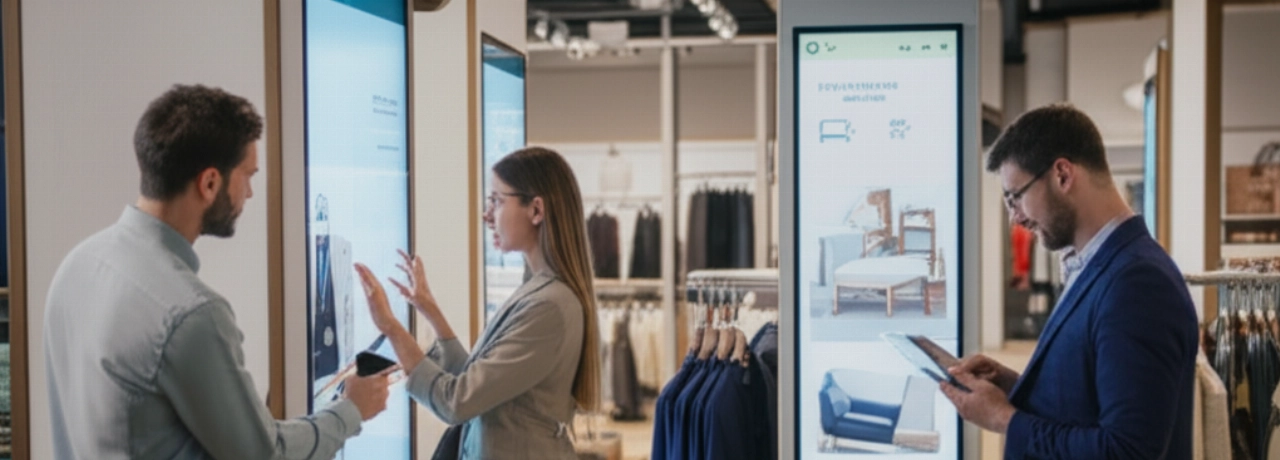Is your B2B e-commerce platform treating every customer the same? In an era demanding tailored experiences, many enterprise platforms struggle with true ecommerce personalization. You're likely grappling with disconnected data, static content, and a 'one-size-fits-all' approach that stifles growth and frustrates your most valuable customers. The result? Missed opportunities, declining conversion rates, and a growing chasm between your digital aspirations and reality.
This isn't just about adding a 'recommended products' widget. This article will reveal how to architect a sophisticated, data-driven ecommerce personalization engine that transforms every interaction into a unique, high-value journey, ensuring competitive advantage and unprecedented customer lifetime value. This is your roadmap to engineering hyper-relevance at scale.

Beyond the Transaction: Why Hyper-Personalization is Your Next Competitive Moat
In the B2B landscape, relationships are paramount. Yet, many digital commerce experiences fall short, failing to replicate the nuanced, personalized interactions of traditional sales. True ecommerce personalization moves beyond basic recommendations. It's about dynamically adjusting pricing based on contract terms, presenting custom catalogs tailored to specific buyer roles, delivering relevant content based on past interactions, and guiding complex purchasing decisions with intelligent configurators.
This strategic shift isn't just about improving user experience; it's about building a formidable competitive moat. By understanding and anticipating your customers' needs at every touchpoint of their customer journey, you foster loyalty, increase customer lifetime value (CLTV), and capture greater market share. Neglecting this means ceding ground to competitors who are already leveraging data to create superior, more relevant digital engagements.

The Architecture of Relevance: Building a Scalable Personalization Engine
Achieving hyper-relevance at enterprise scale demands a robust foundation. It's not about bolting on a feature; it's about engineering an integrated system. The core of a powerful ecommerce personalization engine lies in:
- Unified Customer Profiles: Consolidating data from CRM, ERP, and sales systems to create a single, comprehensive view of each customer and account.
- Real-time Data Ingestion & Analytics: The ability to capture and process behavioral data (clicks, searches, purchases) in real-time, feeding insights back into the personalization engine.
- AI & Machine Learning: Leveraging advanced algorithms to identify patterns, predict future behavior, and automate the delivery of personalized experiences, from product recommendations to dynamic pricing.
- Composable Commerce Architecture: Utilizing a flexible, API-first approach that allows seamless integration with your existing CRM integration, PIM integration, and ERP integration, ensuring data flows freely and efficiently.
- Content & Product Personalization: Dynamic display of products, pricing, promotions, and content based on user segments, firmographics, and individual behavior.
Without a coherent data analytics strategy and a scalable architecture, your personalization efforts will remain superficial, unable to deliver the deep, impactful experiences your enterprise customers expect.

The Personalization Paradox: Avoiding the Pitfalls of Feature-Driven Implementations
Many enterprises fall into the trap of implementing superficial personalization tools that promise quick wins but deliver little long-term value. This 'feature-driven' approach often leads to significant challenges:
- Fragmented Data Silos: Personalization tools that don't deeply integrate with your core systems create new data silos, leading to inconsistent customer experiences and inaccurate insights. This contributes to escalating technical debt.
- Performance Bottlenecks: Poorly optimized personalization engines can severely impact site speed, leading to frustrated users and a drop in conversion rate optimization (CRO). Real-time personalization requires highly efficient data processing.
- High Total Cost of Ownership (TCO): Solutions that require constant manual intervention, lack true AI capabilities, or are difficult to scale often result in a higher TCO than initially anticipated, failing to deliver on their promise of ROI.
- The 'One-Size-Fits-All' Trap in Disguise: If your personalization tool can't handle complex B2B logic (e.g., contract pricing, multi-buyer workflows), it's just a glorified recommendation engine, not a strategic asset.
True ecommerce personalization is a strategic initiative, not a simple feature toggle. It demands a holistic approach to data, technology, and customer understanding to avoid these costly pitfalls.
Case Study Snapshot: Transforming a Global Distributor's Digital Experience
A global B2B distributor faced stagnant online growth despite high traffic. Their generic platform offered no differentiation, treating every customer as an anonymous visitor. Commerce-K partnered with them to implement a sophisticated ecommerce personalization strategy, leveraging their existing CRM and ERP data. We engineered dynamic pricing models based on contract terms, personalized product recommendations driven by purchase history and browsing behavior, and custom content delivery for different buyer personas.
The result? A 25% increase in average order value (AOV) and a 15% uplift in customer retention within 12 months, proving that relevance drives revenue. This wasn't just about adding a new feature; it was about fundamentally reshaping their digital interactions to mirror the value of their long-standing customer relationships.
Commerce-K: Your Partner in Engineering Personalized Enterprise Commerce
At Commerce-K, we understand that enterprise-level ecommerce personalization is a complex undertaking. It requires more than just software; it demands a deep understanding of your business processes, your customer segments, and the intricate web of your existing technology stack. We don't just implement tools; we design and build the underlying architecture, integrate disparate systems, and craft the data strategy necessary for truly impactful personalization that scales with your business.
We are the difference between a vendor who sells you a product and a partner who engineers a competitive advantage. Our expertise in composable commerce, advanced data analytics, and seamless integration ensures that your personalization efforts are not just effective today, but future-proof for tomorrow's evolving customer demands.
Frequently Asked Questions about Ecommerce Personalization
- What's the ROI of enterprise ecommerce personalization?
- The ROI of enterprise personalization is typically seen in increased average order value (AOV), higher conversion rates, improved customer retention, and a significant boost in customer lifetime value (CLTV). While specific figures vary, our clients often see double-digit percentage improvements in key metrics within 12-18 months of a comprehensive implementation.
- How does personalization impact site performance and SEO?
- When implemented correctly, personalization should enhance performance by delivering highly relevant content quickly. Poorly executed personalization can indeed slow down a site. Our approach focuses on efficient data processing and robust architecture to ensure personalization enhances, rather than hinders, performance. For SEO, personalized content is typically rendered client-side or based on user segments, which doesn't negatively impact search engine crawling of your core content.
- Is our existing data sufficient for effective personalization?
- Most enterprises have a wealth of untapped data in their ERP, CRM, PIM, and WMS systems. The challenge isn't usually a lack of data, but its fragmentation and lack of unification. Our initial strategy sessions focus on auditing your existing data sources and developing a roadmap to consolidate and leverage them effectively for personalization.
- How long does a comprehensive personalization project take?
- The timeline for a comprehensive enterprise personalization project varies significantly based on current infrastructure, data readiness, and desired complexity. A foundational implementation might take 6-9 months, while a full-scale, AI-driven engine with deep integrations could span 12-18 months. We prioritize phased rollouts to deliver incremental value quickly.
- Can personalization be integrated with our legacy ERP/CRM systems?
- Absolutely. Integrating with legacy ERP and CRM systems is a core part of our expertise. We specialize in building robust API layers and data connectors that bridge the gap between modern personalization engines and established backend systems, ensuring seamless data flow without disrupting critical operations.
You've seen how true ecommerce personalization transcends basic features to become a strategic imperative for B2B and enterprise growth. It's about engineering a unique, valuable journey for every customer, unlocking unprecedented CLTV and competitive advantage. The complexity of integrating disparate systems, ensuring data integrity, and building a scalable architecture can seem daunting. You might wonder if your current platform can even support this, or if the investment is truly worth it. At Commerce-K, we specialize in demystifying this complexity, turning potential pitfalls into pathways for profit.
Stop navigating technical debt and missed opportunities. Your business deserves a clear digital commerce roadmap that delivers measurable results. The first step isn't a quote; it's a no-obligation Scoping & Strategy Session with our senior architects. We'll help you map your potential, de-risk your investment, and identify the precise personalization opportunities you're currently missing. Click here, tell us about your project, and start building your future-proof commerce engine today.
Now that you understand the power of personalization, discover how we execute a seamless ecommerce migration service or explore the benefits of headless commerce architecture for ultimate flexibility.





